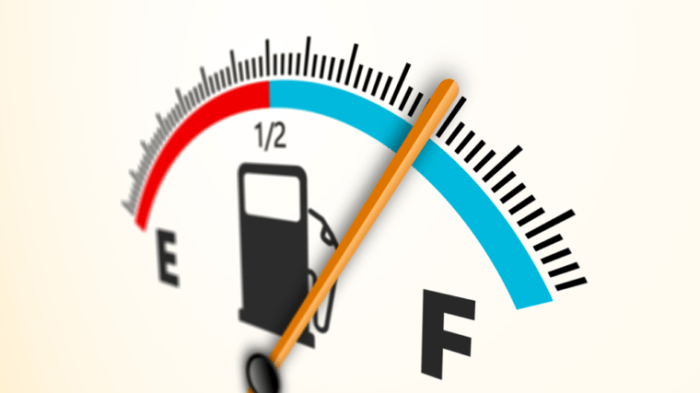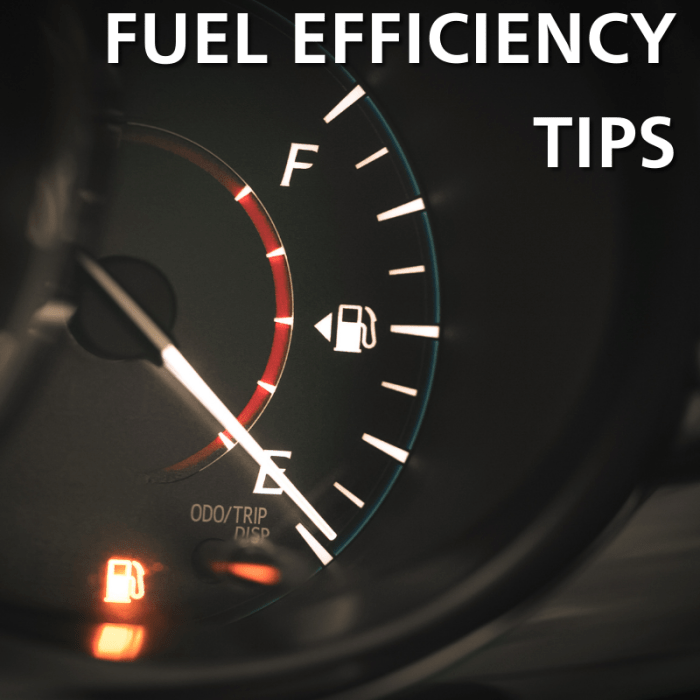Fuel efficiency tips take center stage in this guide, offering a glimpse into the world of saving money and reducing environmental impact with some cool tricks. Get ready to rev up your knowledge!
When it comes to fuel efficiency, small changes in driving habits and vehicle maintenance can lead to big savings and a cleaner planet. Let’s dive into the details and learn how to make a difference on the road.
Overview of Fuel Efficiency Tips

Fuel efficiency is crucial for both saving money and reducing our environmental impact. By using fuel more efficiently, we can cut down on our expenses and decrease harmful emissions that contribute to climate change. According to the Environmental Protection Agency (EPA), the average vehicle emits about 4.6 metric tons of carbon dioxide per year, with transportation accounting for the largest share of greenhouse gas emissions in the United States.
Benefits of Fuel Efficiency, Fuel efficiency tips
- Save money on gas expenses
- Reduce greenhouse gas emissions
- Decrease dependence on fossil fuels
- Extend the lifespan of your vehicle
Driving Habits
When it comes to fuel efficiency, your driving habits play a crucial role in how many miles you can squeeze out of a gallon of gas. By making some simple adjustments to the way you drive, you can significantly improve your vehicle’s fuel efficiency and save money at the pump.
Consistent Speed for Better Fuel Efficiency
Driving at a consistent speed is one of the most effective ways to improve fuel efficiency. Rapid acceleration and sudden braking can waste a significant amount of fuel. By maintaining a steady pace and avoiding unnecessary speed fluctuations, you can help your car operate more efficiently and use less gas. Remember, a smooth and steady driving style is not only safer but also better for your wallet.
Impact of Aggressive Driving on Fuel Consumption
Aggressive driving, such as speeding, rapid acceleration, and hard braking, can have a significant impact on fuel consumption. These habits not only waste fuel but also increase wear and tear on your vehicle. By driving more calmly and avoiding aggressive maneuvers, you can reduce fuel consumption and extend the lifespan of your car.
Smooth Acceleration and Braking to Save Fuel
One of the best ways to save fuel is by practicing smooth acceleration and braking. Gradually pressing on the accelerator and gently slowing down when coming to a stop can help minimize fuel consumption. Remember, every time you stomp on the gas pedal or slam on the brakes, you’re burning more fuel than necessary. By being mindful of your acceleration and braking, you can improve fuel efficiency and make your gas last longer.
Vehicle Maintenance

Regular vehicle maintenance plays a crucial role in ensuring optimal fuel efficiency. By keeping up with maintenance tasks, you can help your vehicle run more efficiently and save money on fuel costs in the long run.
Importance of Tire Pressure
Maintaining the correct tire pressure is essential for fuel efficiency. Underinflated tires can increase rolling resistance, causing your vehicle to work harder and burn more fuel. Be sure to check your tire pressure regularly and inflate them to the recommended level to improve fuel efficiency.
Clean Air Filter Maintenance
A clean air filter is vital for fuel efficiency as it allows the engine to breathe properly. A dirty air filter can restrict airflow, making the engine work harder and consume more fuel. Regularly inspect and replace dirty air filters to ensure optimal fuel efficiency.
Route Planning: Fuel Efficiency Tips
Planning efficient routes is key to saving fuel and maximizing fuel efficiency. By avoiding traffic congestion and taking the most direct paths, you can reduce the amount of fuel your vehicle consumes. Utilizing GPS or apps can help you find the most fuel-efficient routes available to reach your destination.
Benefits of Efficient Route Planning
- Avoiding traffic congestion can reduce idling time, which saves fuel and reduces emissions.
- Shorter, more direct routes can decrease overall mileage and fuel consumption.
- Planning ahead allows for smoother driving, reducing sudden stops and accelerations that waste fuel.